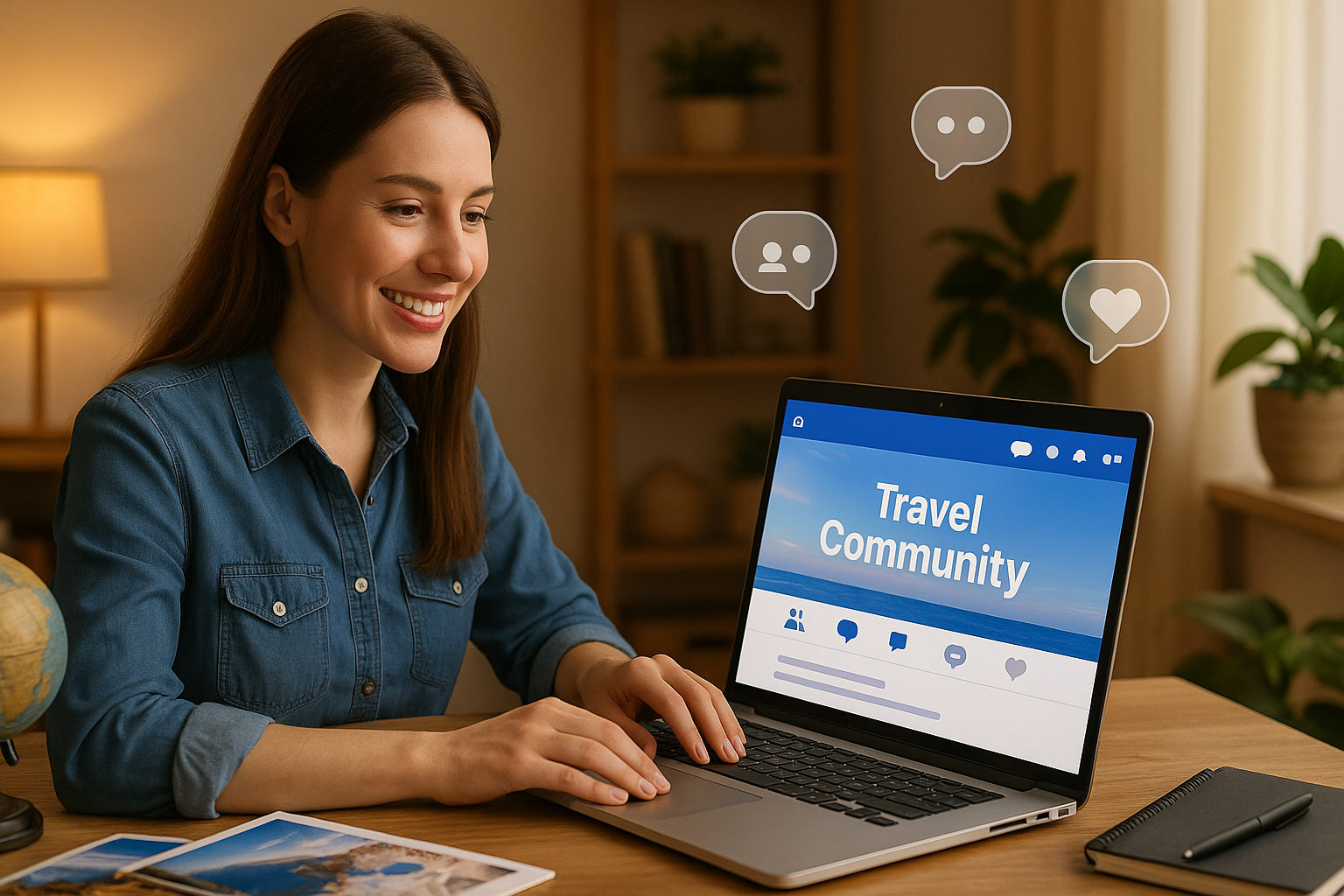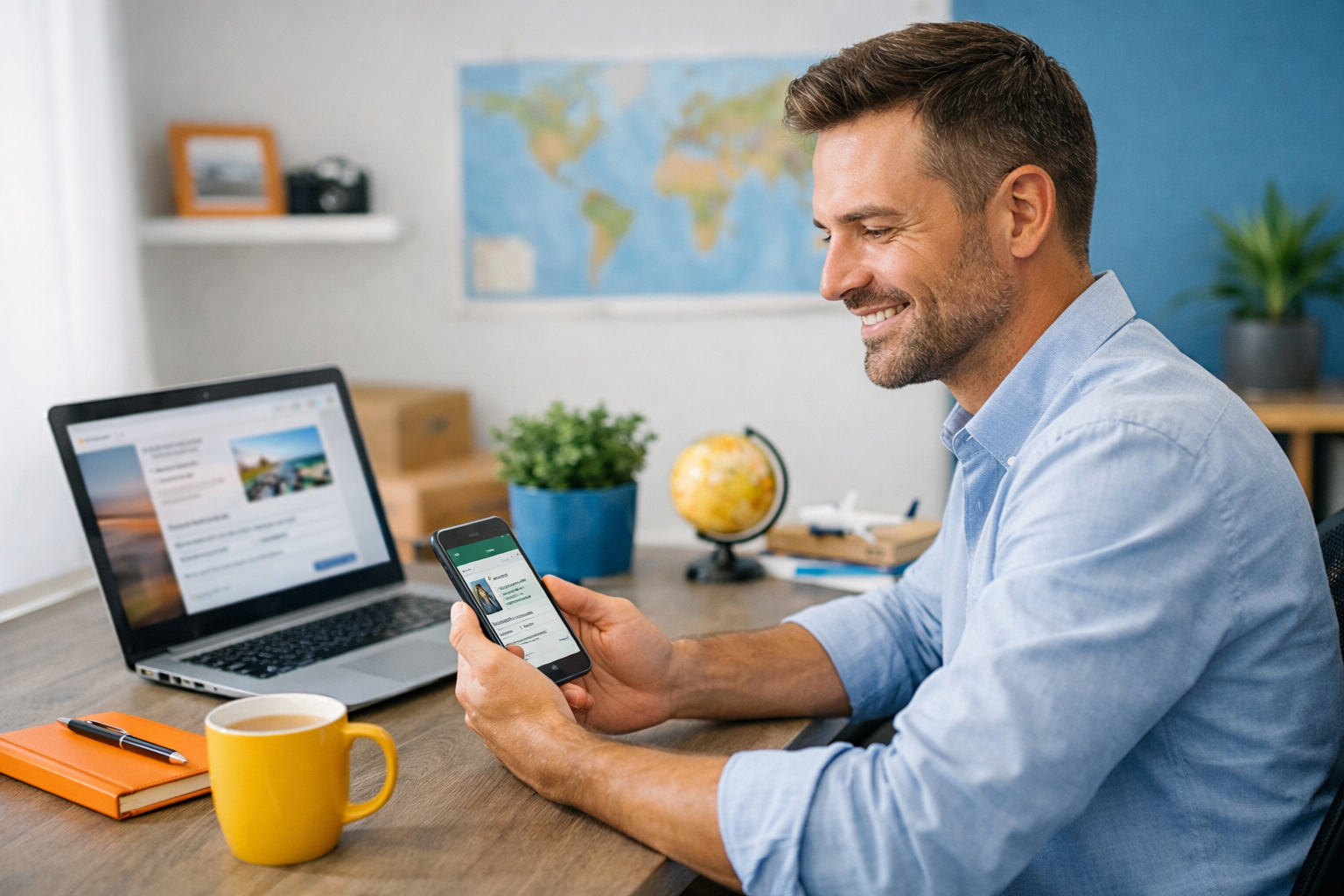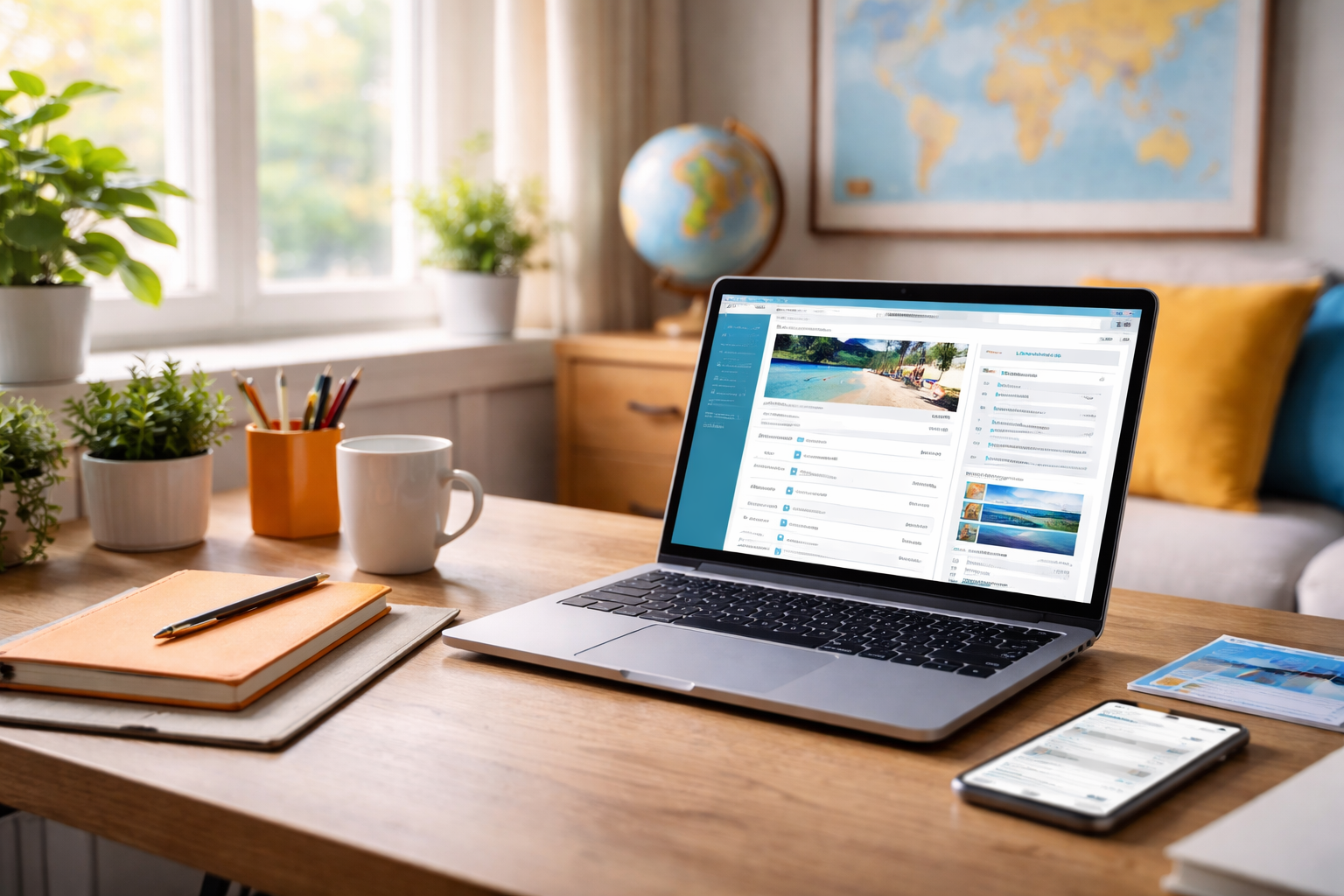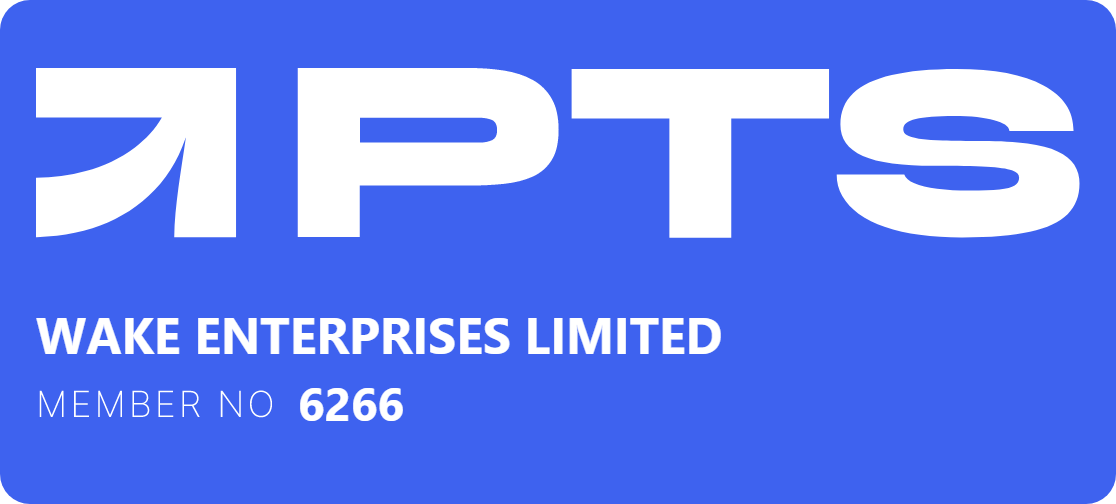Using Facebook Groups to Grow Your Travel Business
Using Facebook Groups to Grow Your Travel Business

f you’re a travel homeworker looking to grow your client base and reputation, Facebook Groups are one of the most powerful – and most underused – marketing tools available today. Whether you’re connecting with fellow travel professionals, joining local community groups, or building a loyal audience of travel-loving followers, knowing how to use Facebook Groups effectively can transform your business.
This post explores how Facebook groups for travel agents can drive enquiries, nurture relationships, and position you as the go-to travel expert in your niche. You’ll discover practical tips, ethical engagement strategies, and insider tricks that can help you turn casual social media conversations into meaningful, commission-earning bookings.
Why Facebook Groups Still Matter in 2025
Despite the rise of TikTok and Instagram Reels, Facebook remains a cornerstone for community interaction — especially for travellers aged 30+. Unlike public posts that disappear down an algorithmic abyss, Groups offer ongoing conversations, repeat visibility, and an authentic platform for relationship-building.
For a travel homeworker, that’s gold. In Groups, you’re not chasing likes; you’re offering value, answering questions, and connecting with people who are actively seeking advice. It’s the digital equivalent of chatting to someone in a coffee shop who asks, “Where should I go for my next holiday?” – only this time, that conversation could happen hundreds of times a week.
Finding the Right Groups to Join
Your success starts with choosing the right communities. Think quality over quantity. A few active, engaged groups are worth far more than dozens that are dormant or full of spam.
Here are the main types of Facebook Groups that work best for travel agents:
1. Local Community Groups
Join groups in your town, region, or county – especially “What’s On” or “Buy/Sell/Chat” communities. Local audiences often prefer to book with someone nearby, even if your business is fully remote.
2. Niche Interest Groups
If you specialise in cruises, adventure holidays, family travel, or LGBT+ getaways, there are countless groups dedicated to these niches. Engaging genuinely in these spaces helps you attract your ideal clients naturally.
3. Travel Industry Support Groups
Connect with other agents, share advice, and stay up to date with supplier news. These are fantastic for networking, especially if you’re new to travel homeworking.
4. Your Own Branded Group
Building your own group gives you long-term control. It becomes your community hub — a place where clients return for inspiration, recommendations, and exclusive offers.
Building Your Own Facebook Group
Creating your own group allows you to nurture leads over time. It’s where curiosity turns into loyalty. To start strong:
- Choose a clear name. Include relevant keywords such as “Travel Inspiration,” “Holiday Ideas,” or your local area (e.g., “Cotswolds Travel Lovers”).
- Write a friendly, informative description. Explain who the group is for and what members can expect.
- Set simple rules. Ban spam but encourage discussion.
- Post consistently. Share destination ideas, travel news, and behind-the-scenes insights.
- Welcome new members. A quick greeting goes a long way in making your group feel human.
The key to success isn’t constant selling — it’s community building. Your expertise will naturally shine through when you help members solve travel dilemmas or offer inspiring recommendations.
How to Engage Without Sounding “Salesy”
The most common mistake travel agents make in Facebook Groups is overselling. People join groups to connect, not to be bombarded with adverts. To strike the right tone:
- Answer questions first, promote later. If someone asks for family-friendly destinations, suggest a few options and mention that you can tailor packages privately if they’d like more details.
- Be generous with your knowledge. Share advice freely – it builds trust.
- Add value with visuals. Use photos or reels to make your posts stand out without pushing offers too hard.
- Use storytelling. Share real travel experiences, client success stories, or “this time last year I was in…” memories.
- Respect other agents. Avoid undercutting or hijacking other professionals’ posts – it damages credibility.
When you consistently offer insight instead of hard selling, members will start tagging you automatically when travel topics come up. That’s organic lead generation at its finest.
Turning Conversations into Clients
Facebook Groups are not a quick-win sales channel – they’re a trust-building ecosystem. Here’s how to transform friendly interactions into confirmed bookings:
- Engage first, message later. Build rapport publicly before moving to private conversations.
- Offer to help, not to sell. For example: “I’ve helped a few people book similar holidays – happy to send you some ideas if you’d like?”
- Follow up respectfully. After you’ve offered advice, follow up a few days later. Keep it friendly, not forceful.
- Invite them to join your mailing list or WhatsApp group. Keep the relationship alive beyond Facebook.
- Share social proof. Post photos of happy clients (with permission), testimonials, or feedback highlights.
Over time, your expertise becomes visible and trusted. When members start tagging you in posts like “Ask Jamie – he’s brilliant with cruises,” you’ve built an authentic referral machine.
Growing Your Reach with Collaborations
Don’t limit yourself to solo marketing. Partner with other local businesses or complementary travel agents to run giveaways, destination-themed lives, or Q&A sessions. Collaborations create cross-pollination — you reach new audiences who already trust your partners.
Example collaborations:
- Work with a local wedding boutique to host a “Honeymoon Planning Tips” live session.
- Team up with a photographer for a “Capturing Memories Abroad” post.
- Partner with a fitness coach for a “Wellness Retreats Abroad” challenge.
These partnerships demonstrate professionalism, expand your network, and give your group members added value beyond travel talk.
How Often to Post in Facebook Groups
Consistency matters more than frequency. Aim for three to four posts a week in your own group and engage daily in others. Rotate your content:
- Mondays: Inspirational destination photo with a story.
- Wednesdays: Quick tip or poll (“Where would you go if you had a free flight today?”).
- Fridays: Lighthearted meme, quote, or personal travel moment.
- Sundays: Exclusive offers or behind-the-scenes sneak peeks.
In other people’s groups, reply to posts, thank commenters, and avoid spamming with links. A well-timed comment can do more for your visibility than ten self-promotional posts.
Facebook Group Tools Worth Using
To manage your activity efficiently as a travel homeworker, use these built-in tools and external apps:
- Post scheduling: Use Meta Business Suite to pre-schedule weekly posts.
- Membership questions: Ask new members where they heard about you or what destinations interest them most.
- Keyword alerts: Monitor when people mention “holiday,” “cruise,” or “travel insurance” to respond quickly.
- Canva: Create branded graphics using your business colours for consistent, professional visuals.
- Metricool or Later: Track engagement to see what content resonates best.
Automation saves time — vital when balancing enquiries, training, and home life.
The Ethics of Engagement
Facebook’s algorithm rewards genuine interaction, but compliance still matters.
Remember:
- Don’t share supplier pricing or confidential deals publicly.
- Always comply with Package Travel Regulations when promoting packages.
- Respect GDPR rules when collecting data from group members.
- Stay positive — professionalism reflects directly on your reputation and on The Independent Travel Consultants brand as a whole.
If you’re ever unsure whether a post crosses a line, ask your mentor or the ITC support team before publishing.
Measuring Success in Facebook Groups
The best metrics aren’t likes — they’re leads. Track:
- How many people DM you after a post.
- How often you’re tagged in travel-related conversations.
- Increases in newsletter sign-ups after group promotions.
- Repeat engagement from regular members.
These indicators reveal genuine business growth — and prove your community strategy is paying off.
Common Mistakes to Avoid
- Posting too much too soon. It can overwhelm members.
- Ignoring group rules. Always check whether promotions are allowed.
- Vanishing for weeks. Momentum matters — set reminders.
- Focusing only on sales. Relationships come first, conversions follow.
Even seasoned travel agents slip up occasionally, so review your activity monthly and tweak your approach.
Jamie Says:
“Facebook Groups are one of the most underrated marketing tools available to travel homeworkers. When used properly, they’re not just a space to post offers – they’re a community where you become the trusted expert people turn to for advice. The magic happens when you show up consistently, stay human, and let your passion for travel do the talking.”
Building a Long-Term Strategy
Don’t think of Facebook Groups as a one-off tactic; they’re a cornerstone of your long-term marketing plan. Combine them with your email list, social media presence, and client database for an integrated communication strategy.
When used alongside The Independent Travel Consultants’ training, templates, and brand support, Groups can help you grow a self-sustaining business rooted in genuine relationships and community trust.
Get In Touch Today
Ready to build a travel business that thrives through community, not cold calls? Join The Independent Travel Consultants network and learn how to turn your Facebook presence into a lead-generating powerhouse.
We’ll show you how to blend authenticity with strategy, using our proven marketing systems, training modules, and real-world mentoring to help you succeed.
Get in touch today to start your journey as a confident, connected, and successful travel homeworker.
About Jamie Wake
Jamie is the founder of The Independent Travel Consultants and a passionate advocate for empowering others to succeed in the travel industry through honesty, training, and community. He brings decades of travel experience, a focus on doing things differently, and a strong commitment to supporting UK-based homeworkers.












